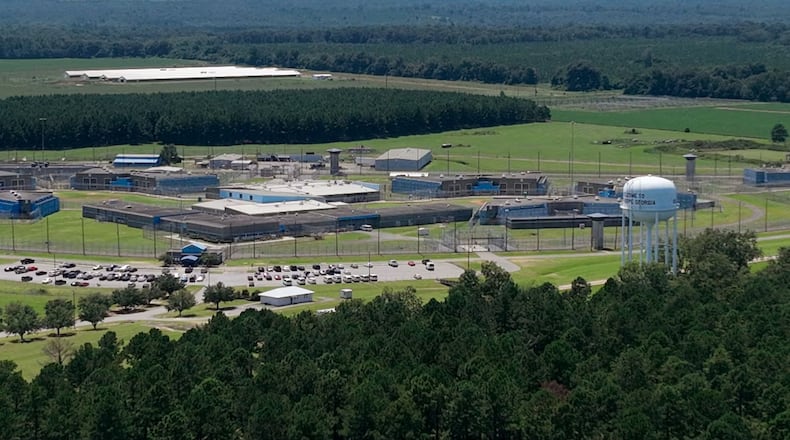Macon State Prison has become one of the bloodiest correctional facilities in Georgia, and no one knows that better than the men and women who work for Macon County EMS.
As the violence at the prison just south of Oglethorpe has intensified, so, too, have the calls for ambulance service. And because of those calls, the county now finds itself dealing with an unexpected and costly burden: more than $100,000 in unpaid bills.
Macon County EMS is one of the hundreds of medical and EMS providers in Georgia with claims in a Texas bankruptcy court seeking more than $75 million from Wellpath Holdings, Inc., the company that backed out of its contract to provide health care for the Department of Corrections.
The Nashville-based company, citing $644 million in debt, filed for Chapter 11 bankruptcy protection in November, just months after its contract with the GDC ended. The case has repercussions in dozens of states where the company has provided health care for prisons and jails, and Georgia is prominent among them, showing once again how the violence inside the state’s prisons has disrupted lives on the outside.
Under its contract with the GDC, Wellpath was responsible for managing all medical services required by the state’s prisoners. That included providing the doctors and nurses working in the prisons, purchasing medication and covering emergency care and hospitalizations.
All told, more than 750 medical and EMS providers in Georgia are seeking $75.6 million from Wellpath, according to an Atlanta Journal-Constitution analysis of the bankruptcy claims filed so far. The list includes some of the state’s largest hospitals. It also includes the EMS services in the small, rural Georgia counties where prisons are located. Those claims are for far less, but they are no less significant, hobbling governments already coping with dwindling tax bases and limited funds.
Macon County’s claim for $108,625 represents about 8% of the county’s annual EMS budget, said George Joiner, the county’s EMS director.
“That doesn’t sound like a lot, but it is,” he said. “We’re a rural county. We don’t have much industry here. It’s mostly agriculture, several dairies. We’re not like (the city of) Macon with millions and millions of tax dollars coming in.”
The AJC found at least 23 county EMS services in Georgia claiming a total of just more than $1 million in unpaid ambulance bills, and some officials are calling on the state to cover the debt.
“We feel like if (Wellpath) isn’t going to pay the balance, the state should step up,” said Mandie Milner, the administrator and clerk in Calhoun County, where the unpaid bills are just one of several headaches stemming from Calhoun State Prison.
The GDC, responding to questions from the AJC, issued a brief statement that did not signal what, if anything, the state might do.
“With regard to Wellpath, it is important to note that the GDC met all our monthly financial obligations,” GDC spokesperson Joan Heath wrote in an email.
Garrison Douglas, a spokesperson for Gov. Brian Kemp, said the governor’s office would not comment beyond what the GDC said in its statement.
Wellpath did not directly respond to a question about how the company plans to deal with the $75 million in Georgia claims. Instead, spokesperson Joanie Brady wrote in an email that the company intends to meet its obligations to its vendors “throughout the Chapter 11 process” and is committed to creating “as much stability as possible” for its vendors and business partners going forward.
A bitter parting
The fallout in Georgia from Wellpath’s bankruptcy is another twist in a saga that played out acrimoniously in the state last year.
Wellpath became the Department of Corrections’ health care provider when the agency decided to privatize that function in 2021, ditching longtime partner Georgia Correctional HealthCare, a division of Augusta University.
Wellpath and the GDC entered into what was essentially a series of nine one-year agreements, with Wellpath able to back out at any time as long as it gave a year’s notice. In June 2023, the company did just that, citing more than $30 million in unanticipated costs, most of it due to the surge in prison violence.
The situation grew into a public feud last year when the GDC gave the contract to its mental health provider, Virginia-based Centurion Health, rejecting efforts by Wellpath to continue in that role with revised pricing.
A lawsuit filed by Wellpath claimed that the GDC didn’t follow state-mandated bidding when it awarded the new contract, worth $2.4 billion. The lawsuit, which ultimately proved unsuccessful, also stated that Wellpath realized shortly after it began serving Georgia’s prisons that the projections provided by the GDC for costs, prisoner health and other issues were “inconsistent with the actual conditions … in the GDC facilities.”
In seeking to dismiss the lawsuit, the GDC said Wellpath canceled its contract in an effort to dictate better terms and then, “like a jilted lover,” tried to block the agency from doing business with anyone else. “Rather than suffer such extortion,” the GDC chose another provider, the filing said.
Wellpath’s bankruptcy filing doesn’t directly address the situation in Georgia. But the large and diverse list of creditors from the state provides a window into how deeply underwater the company was when it ended its relationship with the GDC.
A claim by Wellstar MCG Health for $11.9 million makes the Augusta hospital, formerly known as AU Medical Center, Wellpath’s second largest unsecured creditor. Nine other Georgia hospitals, each with claims of $1.5 million or more, are listed among the company’s 30 largest unsecured creditors.
A spokesperson for Wellstar, Matthew O’Connor, wrote in an email that the statewide health system is “pursuing all avenues for payment” but did not provide details.
The list of claimants also includes six helicopter ambulance bases located near prisons in South and Middle Georgia. Those entities, operated by a Missouri company, Air Evac Lifeteam, have claims totaling just more than $880,000. Another helicopter ambulance service operating in Georgia, Augusta-based AU Health AirCare, has a claim for more than $72,000.
Air Evac Lifeteam, which focuses much of its business on selling memberships in rural communities, has just started the claims process and is still working to determine how much it’s owed, according to Angela Richmond, vice president of accounts for the service’s parent company, Global Med Response.
“Any flight we are unable to collect payment on affects our ability to continue to provide lifesaving services to the communities in which we fly,” she wrote in an email.
Counties struggling
Macon County EMS has two ambulances and employs 12 EMTs to serve a population of just less than 12,000. The escalating violence at Macon State Prison has put it to the test.
Last year, when nine men were killed at the close-security prison, 77 “special transports” were required for inmate-on-inmate assaults, fights or “disruptive behavior/events,” according to GDC incident report data.
According to the county’s records, ambulances were called to the prison a total of 129 times in 2024 and 106 times in 2023. There is no hospital in Macon County, so most of those trips were to Crisp Regional Hospital in Cordele, 32 miles away, or Phoebe Sumter Medical Center in Americus, 20 miles away.
“We feel like if (Wellpath) isn't going to pay the balance, the state should step up."
Joiner, the EMS director, said the number of ambulance runs to the prison has risen 10-15% in each of the four years he’s been in his position. Even when injuries appear minor, the prison often calls for an ambulance instead of using one of its own vans, adding to the strain, he said.
“We don’t mind being called,” he said. “That’s why we’re here. But it’s a burden when they could use a prison van for someone cut and bandaged, not bleeding.”
The prison’s reliance on ambulance service even for relatively minor injuries fits with what consultants hired by Kemp found when they scrutinized the prison system last year. According to the consultants, GDC facilities lack adequate medical resources to treat prisoners themselves, and they are so short-staffed that they are reluctant to spare the officers necessary when prisoners require outside care.
In adjacent Dooly County, with a population of just less than 11,000, the situation is much the same: two ambulances, 10 full-time and four part-time EMTs and a struggle to keep up with the violence at Dooly State Prison.
The county’s ambulances were called to the prison 214 times in 2024 and 167 times in 2023. The county’s claim in the Wellpath bankruptcy is for $93,381.
“It is a catastrophic situation, because we can’t tell the prison, `No, we’re not coming because we don’t think we’ll get paid,’” said Don Williford Jr., the county’s EMS director. “They’re not going to hand us a check. It’s all faith-based payment.”
Williford, too, wants the state to step in, and he said he worries that his county and others won’t have the same negotiating power as the hospitals if it comes down to seeking a settlement from Wellpath.
“We may get crumbs at best,” he said. “That’s what I told our county commissioners.”
Calhoun County, with about 5,500 residents, is also sorely affected even though its claim is for a comparatively small amount: $37,127. The county’s annual EMS budget to operate two ambulances and pay six full-time and three part-time EMTs is just more than $500,000.
“You take $37,000 out of our collections, it will really affect our budget next year,” said Milner, the county administrator.
When the county realized last March that it wasn’t getting paid for sending ambulances to the prison, it notified GDC Commissioner Tyrone Oliver and other agency officials in an email and asked them to investigate. The email said the unpaid bills were causing financial stress for the county “as well as our county citizens whose property taxes have to pay for shortfalls.”
According to Milner, the GDC did not respond until the county sent another email in October to Randy Sauls, the agency’s assistant commissioner for health services.
In reply, Sauls said he was disappointed but didn’t offer a remedy, leaving county officials frustrated.
“Somehow the state ought to pay,” Milner said. “When they put the prison in, it seemed like a good idea. There were visions of grandeur, massive jobs, a boost in population. None of it happened.”
Data reporter Justin Price and investigations editor Lois Norder contributed to this report.
Keep Reading
The Latest
Featured



